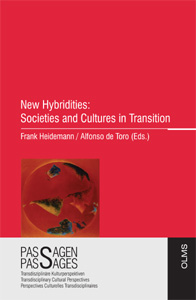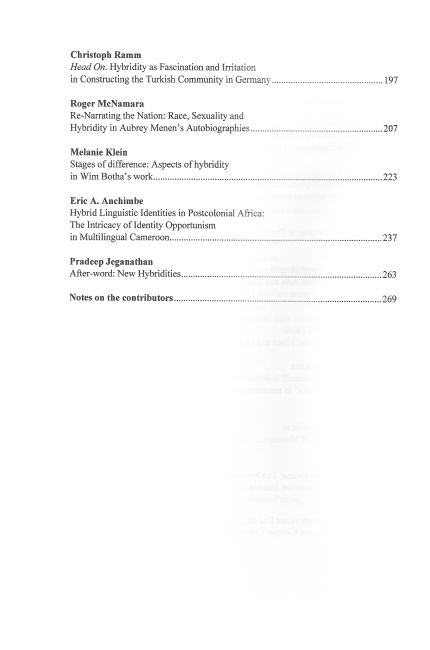
New Hybridities: Societies and Cultures in Transition
Frank Heidemann / Alfonso de Toro (Eds.)
The
thirteen essays were presented at the international conference New Hybridities, held in summer 2004 in a South German
monastery, Kloster Seeon,
organized by Frank Heidemann, director of the Graduiertenkolleg “Postcolonial Studies”
at the University of Munich in collaboration with Alfonso de Toro,
director of the Research Centre of ibero-American
Studies at the University of Leipzig and with
the support of the Deutsche Forschungsgemeinschaft.
The
thirteen papers in this volume take up these questions, focusing on hybridities in new postcolonial contexts or in newly formed
social arenas. They emphasize political dimensions of cultural processes in
recognition of the fact that cultures never were or are monolithic but are
always products of their own complex histories.
The
volume reflects a broad panorama of postcolonial debate about hybridity and its implications in different fields such as
media, internet, film, photography, literature, languages, body, sexuality,
migration, politics of nation and identity. The papers display a awareness of theory and of the interaction between
theoretical reflection about hybridity and
interpretation of different objects; and they focus different territories:
Asia, Japan, China, Vietnam, Malaysia, India, Africa, the USA and Latin
America. Among the conceptual merits of the conference were its transdisciplinarity, its transcultural
approach, and its inspiring consideration of German-Turkish and Hispanic
writers, performers and scholars not often dealt with in connection with postcolonialism and post-modernism. In this sense, the
volume is an important, intriguing supplement to the contemporary debate in
those fields.
Frank Heidemann is Professor for Social
Anthropology at the University of Munich and Director of the DFG-sponsored
Ph.D. Programme “Postcolonial Studies”. He is specialised on Visual Anthropology and most of his publications are
on Religion and Politics in India and Sri Lanka.
Alfonso de Toro is Full Professor and Chair of Romance Literature and
Cultural Studies in the field of France, Latin America, Spain and Portugal at
the University of Leipzig and Director of the transdisciplinary
Ibero-American Research Centre and author of numerous
works to theory of literature, theatre and culture.
ACKNOWLEDGEMENT
Nearly
all of the papers in this volume are revised versions of manuscripts presented
at the international conference New Hybridities, held
July 22-24, 2004, at Kloster Seeon,
Germany. We would like to thank the Deutsche Forschungsgemeinschaft
for financially supporting the conference, including the publication
proceedings, and moreover, for making the Graduiertenkolleg
‘Postcolonial Studies’ at the University of Munich possible to
begin with by offering fourteen scholarships to doctoral and postdoctoral
fellows from 10 countries in Asia, Africa, America and Europe. Our thanks also
go to the students in this programme, who participated in the
planning and organizing of the conference, and who constituted a
close knit academic family over the three years they spent in Munich.
We would also like to thank Homi Bhabha,
Gayatri Chakravorty Spivak, Helen Tiffin, Alfonso de Toro and Robert Young for
coming to Munich and participating in workshops of the Graduiertenkolleg
prior to the conference. Much of our work was influenced by their scholarship
and inspiration. Our thanks for making the conference a success go as well to
our colleagues in Munich Ulla Haselstein, Richard Janney, Bernd Ostendorf, Evelyn Schulz and Bernhard Teuber
and especially Graham Huggan, founding director of
this Ph.D.-programme.
We would like to express our thanks to Nicole Soost,
the coordinator of the programme, who was in charge of the entire scheme,
including the organisation of the conference and the first phase of the
editorial work on this book. Last but not least, thanks go to Juliane Tauchnitz in Leipzig for the editorial assistance
in the final phase of the publication.
Finally, we thank Garcia Uriburu for his kind
permission to use his painting for the cover of this book.

